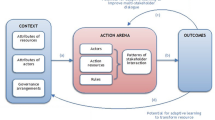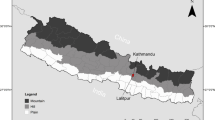Abstract
Public megaprojects, such as major water transfer (MWT) projects must be developed in a socially responsible manner. As such, stakeholders of MWT projects need to adopt behaviors of socially responsible collective action (BSRCA) during the entire project life cycle. Based on MWT projects, the objectives are to: examine the impact of institutional pressures to boost BSRCA, and the mediating effects of obligation to take collective action and organizational support to take collective action. The data was collected from 365 respondents who were involved in MWT projects and analyzed using PLS-SEM method. This study’s contribution to the body of knowledge is that institutional theory may be used to explain how to increase BSRCA in public megaprojects, and the obligation to take collective action could boost BSRCA further. Implications and recommendations on how stakeholders’ BSRCA may enhance water resource management are discussed.


Similar content being viewed by others
Data Availability
Some or all data, models, or code that support the findings of this study are available from the corresponding author upon reasonable request.
References
Aboramadan M, Karatepe OM (2021) Green human resource management, perceived green organizational support and their effects on hotel employees’ behavioral outcomes. Int J Contemp Hospitality Manage 33(10):3199–3222
Bai T, Li L, Mu PF et al (2023) Impact of climate change on water transfer scale of inter-basin water diversion project. Water Resour Manage 37:2505–2525
Bamgbade JA, Kamaruddeen AM, Nawi MNM et al (2019) Analysis of some factors driving ecological sustainability in construction firms. J Clean Prod 208:1537–1545
Bernroider EWN, Harindranath G, Kamel S (2022) From connective actions in social movements to offline collective actions: an individual level perspective. Inform Technol People 35(8):205–230
Boiral O, Talbot D, Paillé P (2015) Leading by example: a model of organizational citizenship behavior for the environment. Bus Strategy Environ 24(6):532–550
Chaudhry NI, Amir M (2020) From institutional pressure to the sustainable development of firm: role of environmental management accounting implementation and environmental proactivity. Bus Strategy Environ 29(8):3542–3554
Cheng Z, Zhao YT, Song T et al (2023) White elephant or golden goose? An assessment of middle route of the South-to-North Water Diversion Project from the perspective of regional water use efficiency. Water Resour Manage 37:819–834
Davison AC, Hinkley DV (1997) Bootstrap methods and their application. Cambridge University Press, Cambridge
DiMaggio PJ, Powell WW (1983) The iron cage revisited: institutional isomorphism and collective rationality in organizational fields. Am Sociol Rev 48(2):147–160
Efron B (1993) In: Tibshirani RJ (ed) An introduction to the bootstrap. Chapman Hall, New York
Farooq K, Yusliza MY, Muhammad Z et al (2023) Employee ecological behavior among academicians at the workplace. Social Responsib J 19(4):713–740
Hair JF, Hult GTM, Ringle C et al (2017) A primer on partial least squares structural equation modeling (PLS-SEM), 2nd edn. SAGE, Thousand Oaks, CA
Hamzekhani H, Mousavi SJ, Vesal M (2021) Water-energy nexus-based economic optimization of water supply projects. J Water Resour Plan Manag 147(8):04021044
He QH, Dong S, Rose T et al (2016) Systematic impact of institutional pressures on safety climate in the construction industry. Accid Anal Prev 93:230–239
Huang L, Wang C, Chin T et al (2022) Technological knowledge coupling and green innovation in manufacturing firms: moderating roles of mimetic pressure and environmental identity. Int J Prod Econ 248:108482
Jaich H (2022) Linking environmental management and employees’ organizational identification: the mediating role of environmental attitude. Corp Soc Responsib Environ Manag 29(2):305–315
Jajja MSS, Asif M, Montabon F et al (2020) The indirect effect of social responsibility standards on organizational performance in apparel supply chains: a developing country perspective. Transp Res Part E-Logistics Transp Rev 139:101968
Jha A, Aggrawal VS (2020) Institutional pressures for corporate social responsibility implementation: a study of indian executives. Social Responsib J 16(4):555–577
Lee BH, Struben J, Bingham CB (2018) Collective action and market formation: an integrative framework. Strateg Manag J 39(1):242–266
Lin H, Sui Y, Ma H et al (2018) CEO narcissism, public concern, and megaproject social responsibility: moderated mediating examination. J Manag Eng 34(4):04018018
Liu YS, Liu SZ, Zhang QC et al (2021) Does perceived corporate social responsibility motivate hotel employees to voice? The role of felt obligation and positive emotions. J Hospitality Tourism Manage 48:182–190
Ma TY, Ding JY, Wang ZF et al (2020) Governing government-project owner relationships in water megaprojects: a concession game analysis on allocation of control rights. Water Resour Manage 34(13):4003–4018
Ma HY, Sun DX, Zeng SX et al (2021) The effects of megaproject social responsibility on participating organizations. Project Manage J 52(5):418–433
Miller K (2006) Social obligation as reason for action. Cogn Syst Res 7(2–3):271–285
Ning Y, Ling FYY (2013) Reducing hindrances to adoption of relational behaviors in public construction projects. J Constr Eng Manage 139(11):04013017
Pasupuleti A, Ayyagari LR (2023) A thematic study of green finance with special reference to polluting companies: a review and future direction. Environ Processes 10:24
Pohlner H (2016) Institutional change and the political economy of water megaprojects: China’s south-north water transfer. Global Environ Change-Human Policy Dimensions 38:205–216
Rhoades L, Eisenberger R (2002) Perceived organizational support: a review of the literature. J Appl Psychol 87(4):698
Rodríguez-Fernández M, Gaspar-Gonzalez AI, Sanchez-Teba EM (2020) Sustainable social responsibility through stakeholders engagement. Corp Soc Responsib Environ Manag 27(6):2425–2436
Sharma A, Singh G (2021) Conceptualizing corporate social responsibility practice: an integration of obligation and opportunity. Social Responsib J 18(8):16–28
Sheng JC, Tang WZ, Webber M (2020) Can inter basin water transfer affect water consumption and pollution? Lessons from China’s South-North water transfer project. Environ Policy Gov 30(6):345–358
Shumilova O, Tockner K, Thieme M et al (2018) Global water transfer megaprojects: a potential solution for the water-food-energy nexus? Front Environ Sci 6:150
Sun S, Zhou X, Liu HX et al (2021) Unraveling the effect of inter-basin water transfer on reducing water scarcity and its inequality in China. Water Res 194:116931
Tagod M, Adeleke AQ, Moshood TD (2021) Coercive pressure as a moderator of organizational structure and risk management: empirical evidence from malaysian construction industry. J Saf Res 77:139–150
Tamminga A, Duijf H (2017) Collective obligations, group plans and individual actions. Econ Philos 33(2):187–214
Testa F, Boiral O, Iraldo F (2015) Internalization of environmental practices and institutional complexity: can stakeholder’ pressures encourage greenwashing? J Bus Ethics 147(2):287–301
Tomasello M (2020) The moral psychology of obligation. Behav Brain Sci 43:e56. https://doi.org/10.1017/S0140525X19001742
Van Dick R, Crawshaw JR, Karpf S et al (2020) Identity, importance, and their roles in how corporate social responsibility affects workplace attitudes and behavior. J Bus Psychol 35(2):159–169
Wang G, He QH, Xia B et al (2018) Impact of institutional pressures on organizational citizenship behaviors for the environment: evidence from megaprojects. J Manag Eng 34(5):1–11
Xie LL, Xu T, Han T et al (2022) Influence of institutional pressure on megaproject social responsibility behavior. J Civil Eng Manage 28(3):177–195
Zeng SX, Ma HY, Lin H et al (2015) Social responsibility of major infrastructure projects in China. Int J Project Manage 33(3):537–548
Zhai WJ, Ding JY, Wang ZF et al (2022) Performance and participants’ decisions analysis in major water resources allocation project based on network governance. Water Resour Manage 36(7):2455–2470
Zhai WJ, Ling FYY, Ding JY et al (2023) Boosting stakeholders’ intention to participate in socially responsible collective action in megaprojects: perspectives of mega water transfer projects in China. Eng Constr Architectural Manage. https://doi.org/10.1108/ECAM-09-2022-0903
Zhang B, Wang ZH, Lai KH (2015) Mediating effect of managers’ environmental concern: bridge between external pressures and firms’ practices of energy conservation in China. J Environ Psychol 43:203–215
Zomeren VM, Postmes T, Spears R (2008) Toward an integrative social identity model of collective action: a quantitative research synthesis of three socio-psychological perspectives. Psychol Bull 134(4):504–535
Acknowledgements
We are particularly grateful to the anonymous reviewers and editors for their comments.
Funding
This research is funded by Postgraduate Research & Practice Innovation Program of Jiangsu Province (KYCX21_0440), the Fundamental Research Funds for the Central Universities (No. B210203063), and the National Social Science Foundation of China (No. 19FJYB004). We also appreciate the financial support from the China Scholarship Council (No. 202006710037).
Author information
Authors and Affiliations
Contributions
W.J. ZHAI: Conceptualization, Methodology, Software, Investigation, Data curation, Writing-Original Draft, Funding acquisition. F. Y. Y. LING: Conceptualization, Validation, Writing-Review & Editing, Supervision, Formal analysis. J.Y. DING: Conceptualization, Investigation, Funding acquisition, Data curation, Resources. Z.F. WANG: Conceptualization, Investigation, Data curation, Funding acquisition, Resources.
Corresponding author
Ethics declarations
Ethical Approval
The authors undertake that this article has not been published in any other journal and that no plagiarism has occurred.
Consent to Participate
The authors agree to participate in the journal.
Consent to Publish
The authors agree to publish in the journal.
Conflict of Interest
The authors declare no conflicts of interest.
Competing Interests
The authors have no relevant financial or non-financial interests to disclose.
Additional information
Publisher’s Note
Springer Nature remains neutral with regard to jurisdictional claims in published maps and institutional affiliations.
Appendix. Measurement Items
Rights and permissions
Springer Nature or its licensor (e.g. a society or other partner) holds exclusive rights to this article under a publishing agreement with the author(s) or other rightsholder(s); author self-archiving of the accepted manuscript version of this article is solely governed by the terms of such publishing agreement and applicable law.
About this article
Cite this article
Zhai, W., Ling, F.Y.Y., Ding, J. et al. Impact of Institutional Pressures on Socially Responsible Collective Action Behaviors for Major Water Transfer Projects. Water Resour Manage 37, 4253–4269 (2023). https://doi.org/10.1007/s11269-023-03551-8
Received:
Accepted:
Published:
Issue Date:
DOI: https://doi.org/10.1007/s11269-023-03551-8




